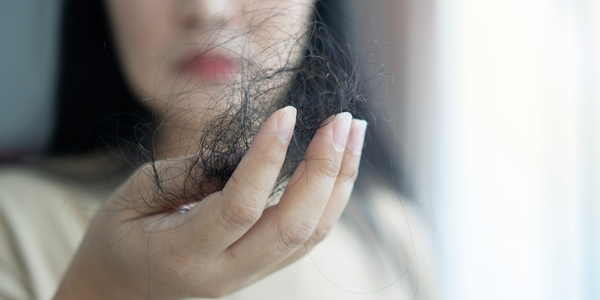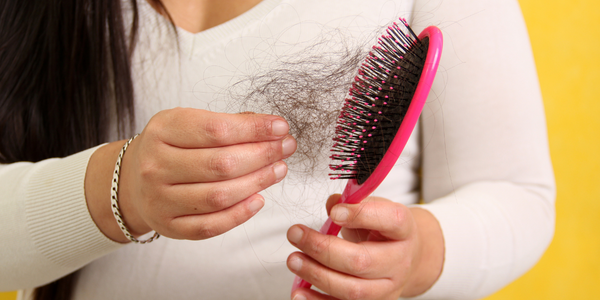Magnesium for Hair Loss
Hair loss is a common problem that affects both men and women. It can be caused by various factors, including genetics, hormonal imbalances, nutritional deficiencies, and certain medical conditions. Understanding the underlying causes of hair loss is essential to find effective solutions.
Understanding Hair Loss
Hair loss, also known as alopecia, is a condition characterized by the gradual thinning or loss of hair. It can affect any part of the body, but it is most commonly seen on the scalp. Hair loss can be distressing and can significantly impact a person's self-esteem and psychological well-being.
When it comes to hair loss, it's essential to understand that it is a complex issue with various contributing factors. While genetics play a significant role in determining one's susceptibility to hair loss, environmental and lifestyle factors also come into play. Factors such as diet, stress levels, and overall health can influence the health of your hair and scalp.
The Science Behind Hair Loss
Hair loss occurs when hair follicles, the structures responsible for hair growth, become damaged or shrink. This can be due to a variety of reasons, including an imbalance of hormones, a lack of essential nutrients, or an immune system disorder. Understanding the underlying mechanisms of hair loss can help in identifying effective treatment strategies.
Furthermore, the hair growth cycle is a delicate process that can be disrupted by various internal and external factors. Each hair follicle goes through stages of growth, rest, and shedding, and any disturbance in this cycle can lead to hair loss. By delving into the intricate details of how hair grows and regenerates, researchers and medical professionals can develop targeted solutions for individuals experiencing hair loss.
Common Causes of Hair Loss
There are several common causes of hair loss. Genetic factors play a significant role in male-pattern baldness and female-pattern hair loss. Hormonal imbalances, such as those occurring during pregnancy or menopause, can also contribute to hair loss. Other factors, such as stress, poor nutrition, and certain medical conditions, can also lead to hair loss.
Additionally, lifestyle choices like excessive heat styling, chemical treatments, and tight hairstyles can damage the hair shaft and contribute to hair loss. It's important to consider all these factors when addressing hair loss concerns and to consult with healthcare professionals to determine the most suitable treatment plan based on individual circumstances.
Distinguishing Hair Loss from Hair Breakage
It is important to understand the difference between hair loss and hair breakage in order to implement appropriate remedies. While hair loss refers to the actual shedding or thinning of hair, hair breakage occurs when the hair strand becomes weak and fractures. Hair breakage is often caused by external factors such as heat styling, harsh chemical treatments, or excessive manipulation of the hair.
Understanding the root cause of your hair issues is crucial in determining the most effective treatment plan. Hair loss can be a result of various factors, including genetics, hormonal imbalances, nutritional deficiencies, or underlying health conditions. Consulting with a dermatologist or trichologist can help pinpoint the specific cause of your hair loss and guide you towards suitable solutions.
Characteristics of Hair Loss
Hair loss is characterized by a gradual thinning of the hair, often resulting in bald patches or a receding hairline. The hair follicles become damaged, and the hair no longer grows back. It is a progressive condition and requires proper intervention to prevent further hair loss.
Furthermore, certain lifestyle choices such as a poor diet, high-stress levels, or improper hair care routines can exacerbate hair loss. Adopting a healthy lifestyle, incorporating nutrient-rich foods, and using gentle hair products can aid in maintaining a healthy scalp environment conducive to hair growth.
Identifying Hair Breakage
Hair breakage, on the other hand, manifests as split ends, brittle hair strands, and a lack of elasticity in the hair shaft. Unlike hair loss, the hair follicles are not damaged, and the hair can grow back once the underlying causes of breakage are addressed.
To combat hair breakage, it is essential to minimize heat styling tools, opt for protective hairstyles, and use conditioning treatments to strengthen the hair shaft. Regular trims to remove split ends and avoiding tight hairstyles that put stress on the hair can also help prevent further breakage.
The Role of Magnesium in Hair Health
Magnesium is an essential mineral that plays a vital role in various bodily functions, including hair health. It is involved in the production of proteins, energy metabolism, and DNA repair. When it comes to hair, magnesium is crucial for maintaining the health and strength of the hair follicles.
The Importance of Magnesium
Magnesium is necessary for the proper functioning of enzymes that are involved in hair growth. It helps in the synthesis of keratin, the main protein component of the hair. Keratin provides structural support and gives hair its strength and elasticity. Without sufficient magnesium, the hair follicles may become weak and susceptible to damage.
How Magnesium Contributes to Hair Growth
Magnesium plays a key role in promoting hair growth by improving blood circulation to the scalp. It helps to relax the blood vessels, allowing for better nutrient and oxygen delivery to the hair follicles. This increased blood flow nourishes the hair follicles and stimulates hair growth.
Furthermore, magnesium aids in the regulation of calcium levels in the scalp. Proper calcium balance is essential for hair growth and maintenance. Magnesium helps to prevent calcium buildup, which can lead to hair loss and scalp issues. By ensuring the right balance of minerals in the scalp, magnesium supports a healthy environment for hair to thrive.
Other Benefits of Magnesium for Hair Health
In addition to its role in promoting hair growth and maintaining follicle health, magnesium also helps in preventing hair loss. It has been found to reduce inflammation in the scalp, which can contribute to conditions like dandruff and hair thinning. By reducing inflammation, magnesium supports a healthy scalp environment for hair to grow strong and vibrant.
Magnesium Deficiency and Its Impact on Hair
Magnesium deficiency is a common problem that can have widespread effects on the body, including the health of your hair. When the body lacks sufficient magnesium, it can lead to various symptoms, including hair loss.
It's important to note that magnesium is a vital mineral that plays a crucial role in over 300 enzymatic reactions in the body. These reactions are essential for maintaining proper muscle and nerve function, regulating blood sugar levels, and supporting healthy immune system function. Without an adequate amount of magnesium, these processes can be disrupted, leading to a range of health issues, including hair loss.
Signs of Magnesium Deficiency
Signs of magnesium deficiency include muscle cramps, fatigue, and sleep disturbances. Other symptoms may include brittle nails, irregular heartbeat, and even depression. It is important to address magnesium deficiency to prevent further complications, including hair loss.
In addition to the symptoms mentioned, magnesium deficiency can also manifest as numbness or tingling, muscle weakness, and even seizures in severe cases. These symptoms can significantly impact daily life and overall well-being, underscoring the importance of maintaining adequate magnesium levels through diet and supplementation.
Link Between Magnesium Deficiency and Hair Loss
Magnesium deficiency can lead to hair loss by disrupting the normal functioning of the hair follicles. Without enough magnesium, the hair follicles may become weak and prone to damage. Additionally, magnesium deficiency can also contribute to hormonal imbalances, which are a known cause of hair loss.
Furthermore, magnesium plays a key role in protein synthesis, which is essential for the growth and maintenance of healthy hair. Without sufficient magnesium, the hair follicles may not receive the necessary nutrients to produce strong, vibrant hair strands. This can result in thinning hair, slow hair growth, and overall hair health issues.
High levels of stress and anxiety cause hair loss. It can also cause hair thinning and sometimes a burning sensation. Magnesium helps prevent anxiety and stress, and hence, reduces anxiety-induced hair loss.
How Magnesium Prevents Hair Loss
Magnesium can help prevent hair loss by addressing the underlying causes and promoting overall hair health.
The Protective Role of Magnesium
By ensuring an adequate intake of magnesium, you can help protect your hair follicles from damage. Magnesium strengthens the hair follicles and promotes healthy hair growth. It also helps to reduce inflammation, which can contribute to hair loss.
Magnesium and Hair Regrowth
In addition to preventing hair loss, magnesium can also stimulate hair regrowth. By improving blood circulation to the scalp and providing essential nutrients to the hair follicles, magnesium helps promote the growth of new, healthy hair.
Other Tips to Prevent Hair Loss
In addition to ensuring an adequate intake of magnesium, there are several other tips to prevent hair loss:
- Eat a balanced diet rich in vitamins and minerals that support hair health, including biotin, vitamin E, and iron.
- Avoid harsh hair treatments and excessive heat styling, which can damage the hair and lead to breakage.
- Practice good hair hygiene by keeping your scalp clean and avoiding excessive use of styling products.
- Manage stress levels, as chronic stress can contribute to hair loss.
- Ensure proper hydration, as dehydration can affect the health of your hair.
Conclusion
In conclusion, hair loss is a common problem that can have a significant impact on a person's self-esteem. Understanding the underlying causes of hair loss and implementing appropriate remedies is essential. Magnesium plays a crucial role in hair health and can help prevent hair loss by strengthening the hair follicles and promoting overall hair growth. By ensuring an adequate intake of magnesium and following other tips to prevent hair loss, you can maintain healthy and vibrant hair.




























